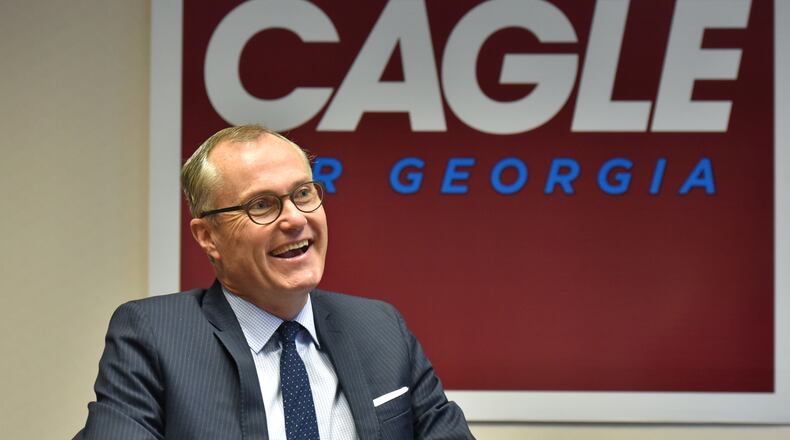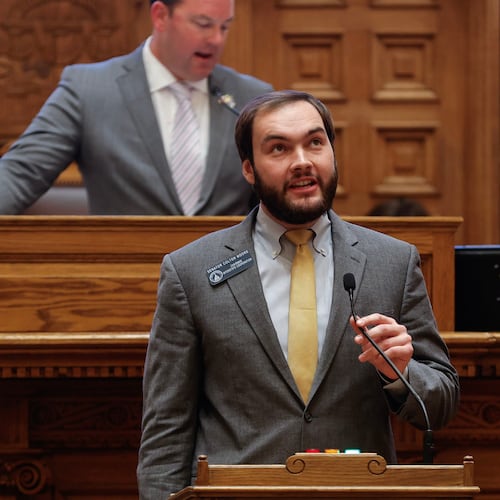In the final days leading up to the state’s 2017 legislative session, a political fund with ties to Lt. Gov. Casey Cagle collected about $120,000 in checks, mostly from businesses with a keen interest in what was going on at the Capitol.
Most donors to the Georgia Conservatives Fund had given to his campaigns or were represented by lobbyists who had, and the money was raised by Cagle’s longtime fundraiser, who works for his gubernatorial campaign.
Almost one-third of the donors are clients of Georgia Link, a top lobbying firm that gave Cagle's gubernatorial campaign more than $20,000 on June 29, records reviewed by The Atlanta Journal-Constitution show.
Such separate funds — which aren’t allowed by law to directly promote a candidate such as Cagle but can push his or her agenda — have proliferated in recent years, and now Georgia’s ethics commission is starting to look at the role such funds play in state politics.
Candidates such as Cagle set up campaign funds to raise — within limits — and spend money for their election or re-election. Increasingly, supporters of politicians are creating separate funds that can raise unlimited amounts of money from donors, often individuals or businesses wanting something from state government.
The ethics commission on Thursday approved an advisory opinion essentially saying the law prohibits candidates or their campaign committees from setting up separate funds or coordinating with them to raise money, push the candidate or attack opponents.
“In such instances of solicitation and coordination, the expenditures on the communications are contributions to the candidate reportable on the candidate’s campaign contribution disclosure report,” the opinion stated.
“This pertains regardless of whether the communications are ‘express advocacy,’ regardless of whether the entity was initially created as an ‘independent committee,’ and regardless of the specific federal tax section under which the entity was formed.”
Stefan Ritter, the executive secretary of the ethics commission, said the opinion wasn’t aimed at any one specific case.
“We have heard of organizations that may have been created that may have been inconsistent with what the opinion states is the law,” Ritter said. “If they are not a campaign committee and they are running a separate organization on their behalf, then I think there is a problem.”
Rick Thompson, a former ethics commission executive secretary who has regularly filed paperwork for such funds, said the advisory opinion doesn’t have the force of a law. But he added, “If I was his (Cagle’s) fundraiser, I would definitely have some angst about it.”
The Georgia Conservatives Fund’s legal counsel, Josh Belinfante, said he couldn’t comment on the impact of the opinion. Lawyers from his firm were on the conference-call meeting that the ethics commission held Thursday.
Earlier this year, Belinfante said the fund "is not there to support one person over another."
“The group is set up to support policy,” he said. “It is not connected to a campaign.”
While Cagle’s campaign says it is not involved, the fund’s email address until the middle of 2016 was rebecca@caseycagle.com, the campaign email for his fundraiser.
Ethics watchdogs have long been concerned about the rising number of such funds.
While candidates for statewide office can legally raise up to $17,100 in total from a single donor for a primary, runoff and general election, for example, there are no limits on how much someone, a business or lobbying association can give political organizations such as the Georgia Conservatives Fund.
“Georgia’s current law has created many loopholes for candidates to flood the state’s elections with dark money,” said Sara Henderson, the executive director of the watchdog group Common Cause Georgia. “This (ethics) opinion is a call to action for our Legislature to work toward passing reforms that support democracy and are transparent to the public.”
The Georgia Conservatives Fund raised about $2.3 million in the six months leading up to the 2017 legislative session and took in contributions of up to $100,000 a pop.
Gov. Nathan Deal's team set up a similar fund, called Real PAC, to promote his agenda in the years leading up to his re-election campaign in 2014.
That lobbyists and special interests would flock to a Cagle fund isn’t surprising.
He is considered a front-runner in the race for governor, and in his role as lieutenant governor he has served as the Senate’s president since 2007. He doesn’t vote on bills before the Senate. But he plays a major role in deciding which bills get a hearing in the chamber, particularly late in the session, when lawmakers vote on dozens of bills with limited debate.
The AJC reported over the summer that Cagle's campaign for governor raised far more money in the months following the 2017 session from lobbyists and special interest PACS than all the other gubernatorial candidates combined.
The AJC also reported earlier this year that the Georgia Conservatives Fund dramatically picked up fundraising as the 2017 session neared.
That continued into the final few days leading up to the Jan. 9 opening of the General Assembly session, according to an Internal Revenue Service report for the first six months of 2017.
Ten of the 33 contributions to the fund listed in the latest report came from clients of GeorgiaLink.
“I think any business interest is looking for ways to support political leadership that is very pro-business,” said Trip Martin, a veteran statehouse lobbyist for GeorgiaLink, “and our clients are certainly of the opinion that Casey Cagle fits that bill.”
The report included money from big companies, such as Coca-Cola ($10,000), Comcast ($10,000), Publix ($5,000), Sprint ($2,000) and Turner Broadcasting ($1,500).
The checks also came from businesses and associations interested in specific legislation.
Pinnacle Entertainment, a casino company and GeorgiaLink client, gave $1,000. MGM Resorts, another casino company, gave $25,000 late last year. The industry again tried during the 2017 session to get a bill passed allowing casinos in the state, but it came up empty.
The gaming industry’s efforts have been stymied, to a large extent, by opposition from Deal. The legislation may not move until a new governor takes office in 2019.
Two other clients of GeorgiaLink — DraftKings and FanDuel — each contributed $500 to the fund four days before the session started.
The House passed a bill during the 2017 session to allow fantasy sports so powerhouses such as DraftKings and FanDuel would be able to operate in Georgia without fear of prosecution for illegal gaming. The measure stalled in Cagle's Senate, but it is still alive for a vote during the 2018 session.
Richard Kessler, a developer of luxury hotels who has contributed to Cagle’s lieutenant governor campaigns in the past, gave $2,500 to the Georgia Conservatives Fund two days before the session began.
The General Assembly passed a historic tax credit expansion in 2015 that helped Kessler's project turn a shuttered Georgia Power plant into a pricey hotel, shops, restaurants and an entertainment venue in Savannah. Backers were hoping to further expand the program this session, but the effort died.
The Alexandria, Va.-based Pet Industry Joint Advisory Council contributed $2,000 to the fund four days before the session started. The pet store industry group was pushing regulations aimed at placating animal rights activists critical of the stores’ practices. The legislation failed to make it out of the state House.
A Cagle rival was critical of the fundraising.
“It’s abundantly clear that Georgia’s political system is rigged to benefit career politicians,” said Cody Hall, a spokesman for former state Sen. Hunter Hill’s gubernatorial campaign. “It’s simple: The political class has purchased their candidate lock, stock, and barrel.
“Georgia voters are sick and tired of career politicians like Casey Cagle abusing their power to finance their political future. Under Lt. Governor Cagle’s ‘leadership,’ the swamp is alive and well.”
About the Author
Keep Reading
The Latest
Featured





